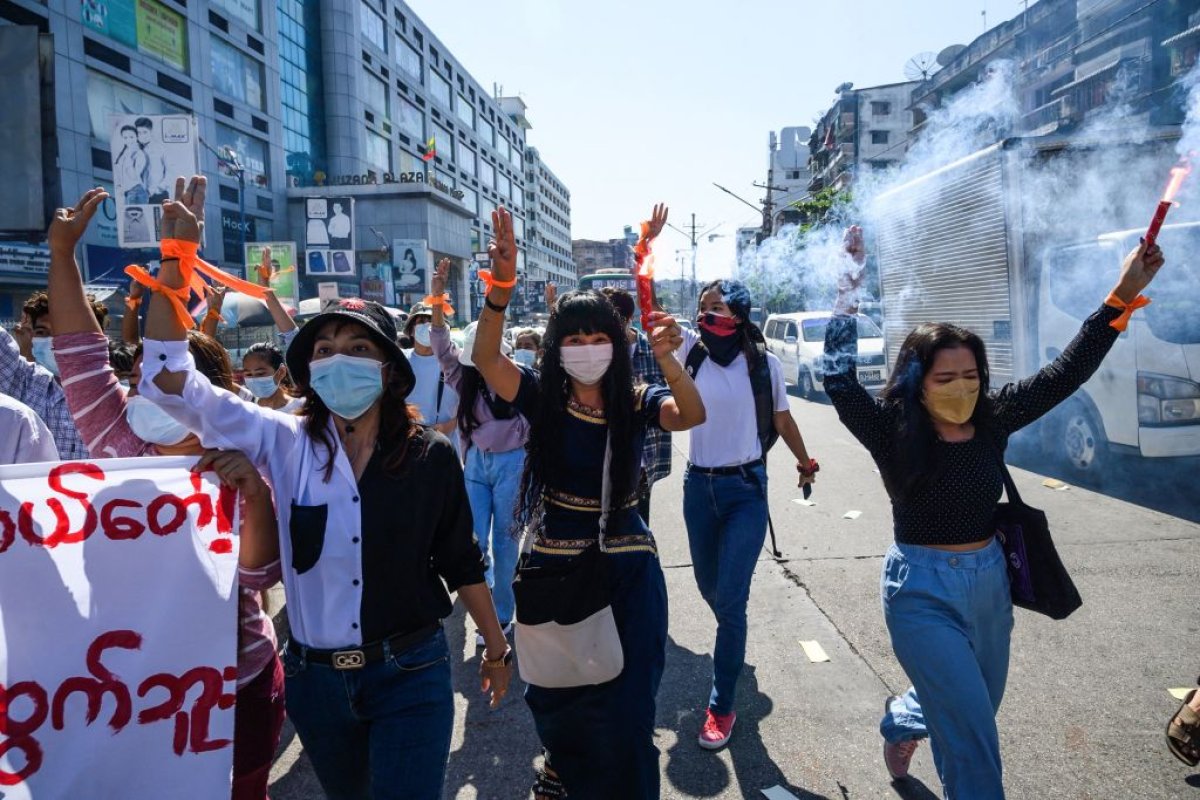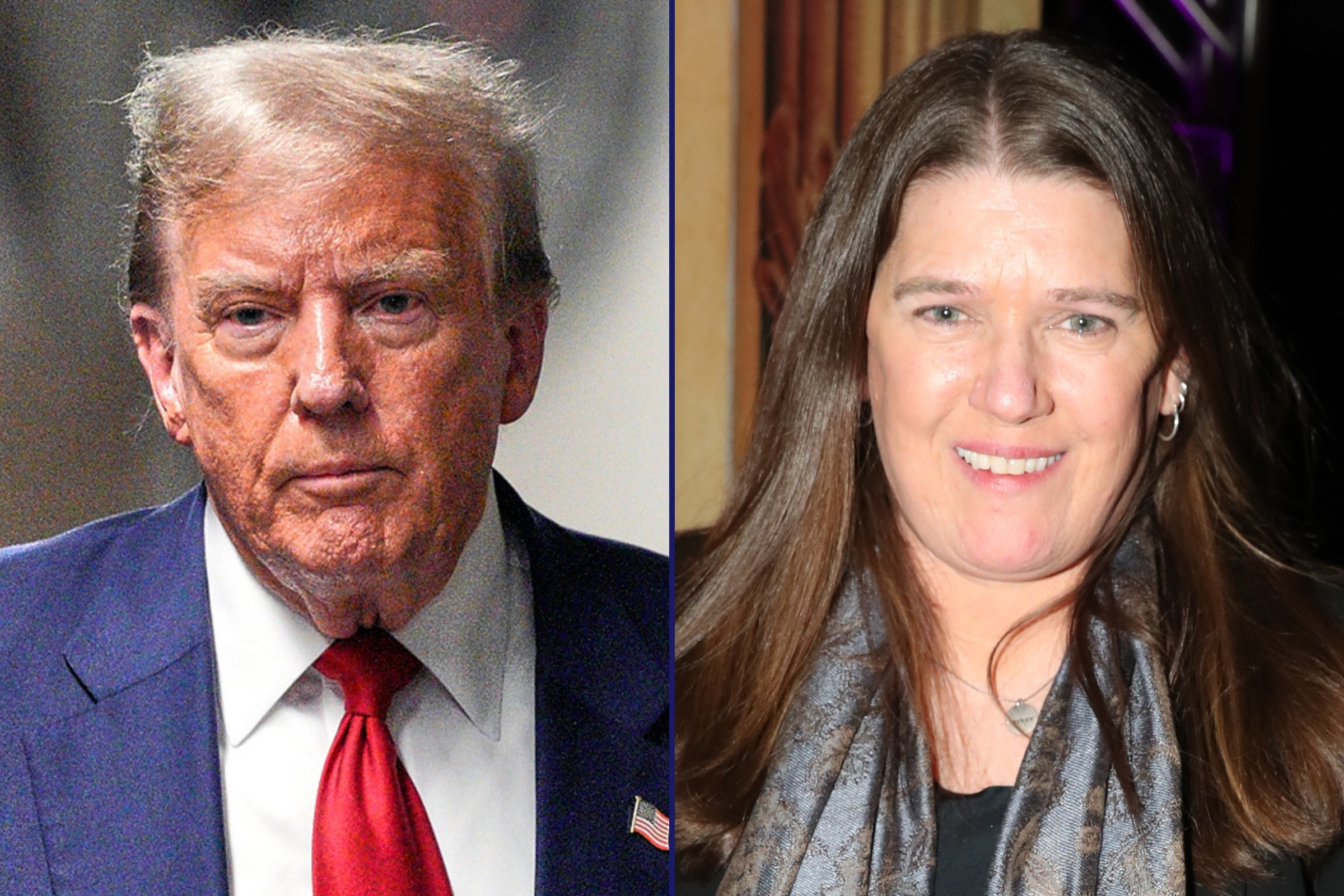Fifty-nine days. Fifty-nine days empty of communication; fifty-nine days knelt praying quietly, expecting family names among the dead fortunate enough to be named.
"I'm not afraid," grandmother gently consoled me over the phone from Myanmar. "I don't intend to flee. I will stay here, whether alive or dead. This is my home."
When the Tatmadaw—Myanmar's military—successfully staged a coup d'état on Feb. 1, 2021, Burmese diaspora communities mourned in anguish, unable to physically comfort our loved ones. The day Myanmar went dark, the Civil Disobedience Movement (CDM) birthed a people's resistance against the Tatmadaw dictatorship, stitching together Myanmar's historically torn ethnic fabrics. Millions of workers went on strike, flooding the streets armed with revolutionary words spoken with hope. And yet, the words of my people fell to the bullets of the Tatmadaw. How can the Spring Revolution vanquish the Tatmadaw? The key lies in holding accountable foreign corporations complicit in ensuring the military's bloody reign.
In Myanmar, we have a saying: "[You] can touch the hair bun on top of my head, but don't you dare touch the wallet tucked away in my waist." Myanmar's political economy is the Tatmadaw's wallet, controlling nearly every sector of the economy. One of the primary reasons why the Tatmadaw's unrelenting grip cannot be loosened is because the military stockpiled wealth through the subjugation of the state bureaucracy, thereby establishing monopolies in vital sectors like banks, gas and electricity.
If mass movements like the CDM intend to succeed, they must cut off the Tatmadaw's control of the economy. The two biggest companies in the country are military-run conglomerates: Myanmar Economic Holdings Limited (MEHL) and Myanmar Economic Corporation (MEC). Combined, the companies earned the Tatmadaw nearly $16.6 billion from 110 domestic and 60 foreign companies, many of which are joint ventures. Based on a 2019 United Nations fact-finding mission, some of this revenue is used by the military to stockpile weapons and commit crimes against humanity against Rohingya Muslims. Given how closely tied corporations and the Tatmadaw are, one of the only pathways toward defeating the Tatmadaw is to crush its monopoly over the local economy.
Businesses cannot claim to be neutral actors during a humanitarian crisis. Companies like French oil multinational TotalEnergies SE and Chevron must be held accountable because their cooperation with the Tatmadaw demonstrates complicity in spilling innocent, civilian blood and legitimizing an illegitimate government. Discouragingly, TotalEnergies SE stated that it would not withhold payments to the military junta nor cease operations in the Yadana offshore gas field. More egregious, Chevron lobbied against the U.S. Department of State's sanctions which restrict the company's activities in Yadana. Chevron has a longstanding relationship with Myanmar Oil and Gas Enterprise (MOGE), a state-owned company closely connected to Tatmadaw generals. Representing the military's largest source of revenue, Yadana has become a lucrative extraction site for gas and earned the Tatmadaw at least $120 million in taxes in 2018. Demands for Chevron to stop bankrolling the Tatmadaw resound globally, with the Action Network petition currently at 200,000 signatures. Additionally, during an "Anti-Chevron Day" demonstration, protesters from the Philippines, United States and Australia demanded Chevron to sever ties with the Tatmadaw. When questioned about Chevron's role, Chevron spokesperson Braden Reddall condemned the Tatmadaw's abuses while excusing the company's actions citing "breach of contract" issues.

Chevron's lack of accountability and commitment to disengagement is extremely dangerous because corporations are the lifeblood of the Tatmadaw. While 50 Western companies like H&M and Facebook issued joint statements condemning the coup and its perpetrators, Asian businesses remained disturbingly quiet. Protesters on the ground have been dutifully vocal. One protester said, "The people will appreciate companies who stand by them and welcome their ambitions to do business responsibly in the country." Despite public outcry against corporations, Thailand's oil and gas company PTT—which pays upwards of $500 million to junta-controlled enterprises—plans to continue partnerships with military-linked companies to expand its engagement in Myanmar. Beyond PTT, Sembcorp Industries, Adani, Hilton Worldwide Holdings, Shangri-La Asia, Suzuki Motor and British American Tobacco remain the largest contributors to the Tatmadaw.
If my people's struggle for freedom is to bear fruit, corporations must be held responsible. Tom Andrews, United Nations special rapporteur, put it best: "The revenues that the military earns from domestic and foreign businesses substantially enhances its ability and capacity to carry out these grave violations." Corporate responsibility comes in numerous forms.
First, corporations can start by withdrawing from Myanmar or suspending activities until the people of Myanmar obtain federal democracy. Until the legitimate government, the National Unity Government (NUG), elected by the people of Myanmar is granted its place, corporations must sever all ties. Further, corporations may say that they have no relationship with the Tatmadaw. However, as proven by the Tatmadaw's vast control over the economy, every economic action within Myanmar is rooted in the military.
Second, corporations can help ramp up transparency by reporting what they pay and to whom, ensuring that their taxes do not go to the illegitimate government. Collective action is integral; by acting in concert with one another, corporations can strain the revenue earned by the Tatmadaw. Countries like the United States must step up and pass the Burma Act. The Burma Act increases humanitarian aid, places pressure on Myanmar via sanctions and combats corporations involved with the military. Regular citizens also play a pivotal role; people must call their senators and representatives to co-sponsor the Burma bill. Historically, collective action through global solidarity proved crucial in ending South African apartheid. Joseph F. Jordan called this dismantling the "machinery that undergirded apartheid." In the case of Myanmar, the machinery supporting the Tatmadaw is an economy inextricably tied to corporations. To break the machinery, corporations must be held responsible.
It has been over 300 days since the coup and corporations still continue business as usual. When business as usual supports the mass murder of innocent civilians, it's become the business of killing. Corporations have a social responsibility to either find ways, whatever they may be, to stop funding the Tatmadaw or exit Myanmar.
In Myanmar, the coming of spring harkens a time for renewal and newfound strength. The budding of the people's revolution cannot take place if corporations continue to support the Tatmadaw. Now is the time for corporations to be held accountable; profit cannot come at the price of my people.
Thang Lian is currently a student at Duke University studying public policy. Lian is Chin, an ethnic group in Myanmar religiously persecuted by the Burmese military. Back in 2008, Lian and his family escaped from Myanmar and moved to the United States as refugees. Lian hopes to be a voice for his community and illuminate what is happening in Myanmar. Follow him on Instagram: @thang.x.lian.
The views expressed in this article are the writer's own.
Uncommon Knowledge
Newsweek is committed to challenging conventional wisdom and finding connections in the search for common ground.
Newsweek is committed to challenging conventional wisdom and finding connections in the search for common ground.
About the writer
To read how Newsweek uses AI as a newsroom tool, Click here.








